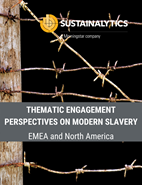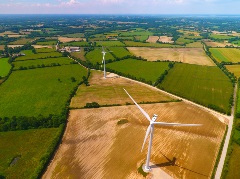10 for 2018: ESG Risks on the Horizon
In 10 for 2018, we focus on the ESG issues we anticipate could pose significant risks for investors. The ESG issues in focus fall into four broad themes: water management, climate change, consumer protection and stakeholder governance. Learn more about the stories behind these issues below.
An investment firm that puts sustainability at the heart of the company
Econopolis combines financial analysis with its qualitative evaluation of management and macro-economic themes to construct a portfolio that it believes will be competitive and sustainable in the long term. Their qualitative approach to ESG presented them with two challenges: How can they measure their ESG performance against that of other leading responsible investors? And, how can they reassure clients that their approach is credible?
Sustainable Banking Insights
An increasing number of financial institutions integrate sustainability considerations such as environment, social and governance factors into their investment decisions and product development. Increased customer awareness, regulations, and growing evidence of the long-term benefits of considering sustainability in investment decisions has led to a significant growth in the sustainable finance field.
European Commission study on ESG ratings agencies
Given this context, Sustainalytics believes now is the right time for the European Commission to look at ways to strengthen the quality of corporate ESG reporting and disclosure, and encourage greater transparency regarding the processes ESG research and ratings agencies have in place to arrive at company-level ESG ratings. To ensure our views are heard, herein Sustainalytics provides our perspectives with respect to corporate disclosure, insights into our research processes, and how we believe the European Commission can help to strengthen the practice of sustainable investing.
Taking responsibility through the consideration of ESG factors and Global Compact Principles
Placing its clients’ interests centre stage, ABN AMRO understands the importance of delivering optimum service and offering transparent and simple products, while remaining at the forefront of technological developments and innovative solutions for client convenience. As part of its fiduciary duty and as a bank that commits to the United Nations-supported Principles for Responsible Investment, ABN AMRO has a detailed plan for ESG integration, engagement and sustainable investing.
Tomorrow's Board
The world is changing faster than it ever has. As a result, companies are facing increasingly complex and numerous challenges. They need to adapt faster, and in this process, the board has a crucial role to play. A new vision of the board is needed to help start a process today that will result in them being better prepared for tomorrow’s challenges.
Preparing for a sustainable future through ESG investment and engagement
ING Wholesale Banking (WB) is the commercial banking business of ING Bank N.V. Using a forward-looking financing approach that incorporates environmental, social and governance (ESG) considerations, ING WB provides banking services for large, multinational corporate clients, banks, insurance companies and other institutional investors.
Investor’s Guidance on Children’s Rights Integration
To establish how, and to what extent, investors are considering children’s rights in their policies and practices, GES also worked with the Global Child Forum, a Swedish not-for-profit foundation, to survey asset owner PRI signatories in 2014, 2015 and 2017.
Shipbreaking: Clean Shipping in Deep Water
Cleaner shipping has been a trending topic particularly since the International Maritime Organization (IMO) declared that 2020 will mark the “beginning of a decade of action and delivery” for the shipping industry.[i] A key approach to cleaner shipping is for companies to renew their fleet with more environmental-friendly vessels. However, this approach triggers an obsolescence of older vessels and increases shipbreaking activity. In Sustainalytics’ 10 for 2020 report, we mention the issue of shipping practices with large environmental impacts including shipbreaking practices which we will explore more in depth in this article.
Chilean Aquaculture: Expansion into Troubled Waters?
In November 2019, as part of the Sustainable Seafood Engagement, Sustainalytics visited Chile to learn more about the country’s rapidly growing aquaculture industry. Commercial salmon farming has developed quickly in Chile over the past two decades, and today the country is the second largest producer of seafood in the world. Although salmon is not a native species to Chile, the climate in the southern part of the country (zones 10 and 11) offers excellent conditions for farming activities. Farmed salmon now represents the country’s second largest export and the industry provides thousands of jobs for people living in some of Chile’s most remote communities.[i] Despite this economic success story, the industry also faces environmental and social challenges which may cause investor risk. These risks may become more pronounced in the future, as the sector now looks to expand deeper into biodiversity hotspots.
Infographic - Creating Impact Through Thematic Investing
In this year’s edition of our 10 for series, we put an environmental, social and governance (ESG) lens on 10 investment themes that may offer investors an opportunity to create a positive social and environmental impact through the equity market. The trends we identify are driven by corporate initiatives to scale new technologies, improve social conditions, conserve ecosystems and mitigate climate change.
Climate Bond Verification Services
Climate bonds, loans or debt instruments are used to finance or re-finance projects that address climate change and are in line with achieving the goals of the Paris Climate Agreement. Such projects include wind farms, solar plants, sustainable buildings, etc. and can be found in a multitude of sectors including shipping, agriculture, energy or forestry amongst others.








.tmb-thumbnl_rc.png?Culture=en&sfvrsn=72dd1885_2)









.tmb-thumbnl_rc.png?Culture=en&sfvrsn=68e0bae7_2)

.tmb-thumbnl_rc.jpg?Culture=en&sfvrsn=33ca126e_2)